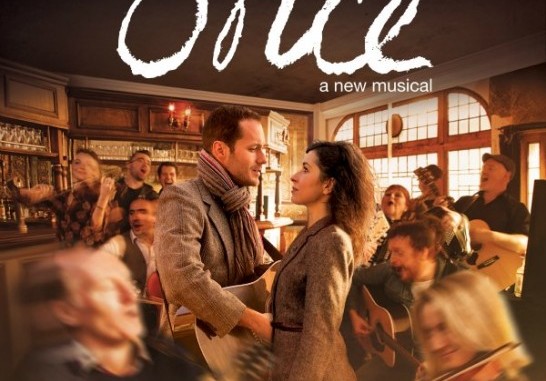
Musical Theatre from the West End: Simply Spectacle [by James Wenley]
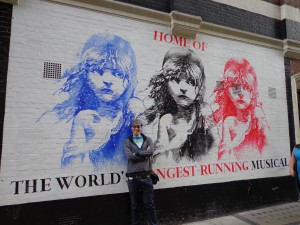
New Zealand theatre has longed looked to the UK with a gleam of idolisation. Just as this nation’s story has been one of a gradual weaning off the Mother Country’s teat, so too has the nation’s theatre slowly relied less on overseas imports and claimed our own stories.
That’s not to stay England’s theatre output doesn’t have a high level of production on our local shores for our companies, and esteem from our audiences – it very much does. Silo often program Royal Court buzzes, and Auckland Theatre Company’s production of British playwright Richard Bean’s questionable comedy The Heretic just finished at The Maidment.
Ignoring the colonial aftertaste, there’s a very good reason for this – UK theatre, despite budget and funding cuts, remains a powerhouse in world theatre. Indeed, the funding crisis in Britain seems to have given the arts a renewed energy and the focus, not able to merely rest on their tradition of creating good theatre, but also having to justify the worth – both to the economy, and to the soul – of what they are creating now.
After a 2011 trip to the home of Broadway, I had longed to tick off that other complementary bucket list necessity: London’s theatre land, the West End. I fed myself on the capital’s theatre for two weeks in June, and then returned for the last dessert in three days in July.
And I discovered a West End with purpose. It’s incredible to be able to see so much theatre, in so many different beautiful theatres. There’s a strong heritage feeling, with levies contributing to ongoing restorations of the theatres. Programs crowed about very recent additions like greater foyer space and more women’s toilets.
In Part One of my theatre trip report I talk about one of my great theatre loves: the Musical theatre. My visit took straddled a major big deal new opening – the Sam Mendes’ Charlie and the Chocolate Factory, and the discounted-to-the-hilt death of Spice Girl’s Musical Viva Forever, and everything in between.
Musical Jukeboxes, or why the Spice Girls really are Wannabes

Viva Forever looked like a sure fire hit on paper. With the blessing of the 90s girl-power-super-group, it packs a score of Spice Girls hits, a book by Jennifer Saunders, and the producing nous of one Judy Craymer of Mammia Mia fame. But after opening at the end of 2012, in May this year it was announced that show would be closing, with a loss of 5 million pounds. Plagued by hostile reviewers and bad word of mouth, an earlier rejig of the show was not enough to save it. Craymer said: “The show has evolved since we first opened and is now brighter, lighter and funnier, but despite the wonderful audiences and extremely positive feedback we just can’t make it work.”
Of course, I couldn’t resist seeing this before it closed.
The Jukebox Musical – where existing music, usually from one established artist, provides the score – has been ubiquitous in Musical Theatre. ABBA-fied Mamma Mia remains the model, but perhaps Viva Forever marks the death of its dominance.
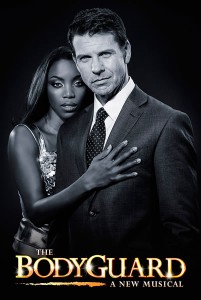
The Bodyguard, also running on the West End, has been doing a lot better. Based on the 1992 film starring Whitney Houston and Kevin Costner about a bodyguard protecting a music starlet from a dangerous stalker, it is helped that the film’s soundtrack happens to be one of the best selling albums of all time, and the stage show is able to incorporate some of Whitney Houston’s other greatest hits. Whereas Viva Forever is frothy and slight, The Bodyguard largely operates as an effective romantic drama with good tension and emotionally honest characterisations, aided by the warm charisma of its leads.
Its film roots make for good inspiration – the stage flats move to frame the action in close-ups, fade outs, and snap cuts. The prologue is particularly cinematic: playing in widescreen, it had a bullet effect and snap to black that made the audience scream.
The use of Houston’s songs within the drama is for the most part diagetic if occasionally forced, mostly performed by the popstar Rachel Marron (Heather Headley) at various concerts. Her co-lead Llloyd Owen as Frank Farmer sings (but by no means to Musical theatre standard) when he gets up and gives ‘I will always love you’ a go at a Karaoke bar.
But the show reveals its real agenda at the curtain call, when The Bodyguard is reduced to bad Whitney karaoke, with everyone giving it a go, including the return of Rachel’s dead sister. It’s a celebration at odds with the bittersweet conclusion, which doesn’t see our romantic leads together. Such is the stuff of Musical theatre curtain calls, and the inevitable demands of the jukebox musical form.
We expect, nay demand, the inevitable girl power blowout in the Viva Forever finale. However, if you were less charitable than me, you could say that entire show was bad Spice Girls karaoke.
The story focusses on Viva, who together with her girl band Eternity, aspire to make it big (clearly learning a lesson from Posh, there are only four members of this particular band). They enter a generic TV talent show competition, and along the way learn lessons about friendship, fame, and how girls rule. But as I was watching it, I couldn’t help but being reminded of a different show.
Presenting… Spot the patented Mammia Mia Template:
- A spunky young female lead who doesn’t know who her real Dad Mum is (Viva is adopted you see)
- An eccentric SINGLE mother (she lives on a houseboat). Discovers during the show that she would rather like a man back in her life.
- Mum has a tall, sexually suggestive comic relief friend who likes younger men
- The If you change your mind moment: In a hotel mix-up, Mum and love interest have to share a hotel bed! Singing 2 becomes 1, they realise their attraction.
- Mum has trouble letting her daughter go, worries how quickly she is growing up
While unoriginal, it’s not as bad as it might sound. There are some great arrangements of the songs, including a Spanish fused ‘Spice up your life’. There’s some good Saunders comedy around the talent show theme, including sassy Cowell/Osbourne judges and a production assistant who mostly speaks in hash tags. Surprisingly, Viva’s love story between her and her musical coach is not overtly pushed and actually plays quite believably. He’s got a great moment on guitar, softly singing the title song. You could hear all the ladies in the audience sighing.
So why did it fail? Bearing in mind I saw the re-jigged show, which dropped some of the more obscure Spice Girls singles, Viva Forever fatally ends without a satisfying pay off. It actually has many of the elements it needs there, and succeeds as a musical comedy.
The fame game is a logical place for the story to go as Viva becomes a star in the competition, and links directly to the dream and lifestyle the Spice Girls brand was selling in its 90s heyday. Cleverly too it acknowledges that celebrity has moved on from the 90s, and is even more intrusive – a message The Bodyguard more seriously delivers. We only get part of the story here while Viva is on the talent show, but maybe the talent show format as plot vehicle is itself dated as the franchises cannibalise each other’s ratings and are no longer the dominating forces they were in the mid 2000s. Maybe, it would have been better to see more of the “real” celeb story – what happens when fame is achieved? That would give us a cautionary tale more in line with the Spice Girl’s own trajectories, rather than just the fluffy dream.
But maybe there’s another reason for the show’s failure – it does entertain after all. Maybe it’s still soon to relive the Spice Girls nostalgia. Mamma Mia is inherently about reliving glory days. Spice Girls fans are still in their glory days. Perhaps Judy Craymer would do well to wait till these fans are older, have girls of their own and spending power, and then try again?
A Tale of two Dahls
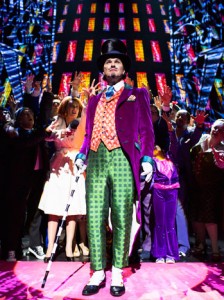
Charlie and the Chocolate Factory, directed by the highly credentialed Sam Mendes with songs from March Shaiman and Scott Whitman (of Hairspray and Smash fame) opened with ravenous attention, and I caught it during the week of its official opening. Media were quick to compare it to another theatrical Roald Dahl adaption… and often not favourably.
Yes, it was a case of Charlie versus Matilda. Matilda, produced by the Royal Shakespeare Company with the inspired score of Australian entertainer Tim Minchin has been a bonafide British hit, opening the West End in late 2011 and on and Broadway in April this year.
Comparing the two, it’s a classic opposition of story versus spectacle, soul versus surface. There are no golden ticket prizes for guessing which show had which. The Charlie and the Chocolate Factory creators seemed to take the Gloops, Beauregarde and Tevees as their cues, stuffing us with short term fleeting pleasure over Charlie’s sincerity and simplicity.
The first half introduces Charlie’s Dickensian squalor and is rather schmaltzy, focussing on “poor” Charlie with nice (sweet) songs between him and his parents and bedridden Grandparents. The other kids each get their introductions as they find their golden tickets – you know the drill here – but the first half is all a big tease for the second half, as it’s not until after interval that we finally get inside Wonka’s Factory.
In this act the episodic plot leads to a succession of flashy (and theatrically wonkaful) set pieces: Gloop travels up a huge chute, Mike Tevee shrinks and travels through tv channels, Veruca becomes a blueberry before our eyes, in the nut room the Oompa Loompas dance on the back of giant squirrels (a series of gleeful visual tricks help sell these full size actors as half size).
For all the garish whiz-bang million dollar stage tricks, Wonka himself, played by Douglas Hodge, was one of the most subtle parts of the show, with a little twitch of his painted on moustache betraying his interior world. Act Two belongs to Wonka, and the other bratty children. Charlie fatally all but disappears. He really only needs to stick around long enough, and the factory, gee whiz, is his.
The Shaiman soundtrack is flashy, with different musical styles for everyone (Violet’s is fittingly a bubble-gum hip hop sound!). Its momentarily clever, but nothing to remember. And then, for the climax, something odd happened. After selling their original score, out of nowhere comes ‘Pure Imagination’. You know the one – the famous track from the Gene Wilder film. And it was wonderful, the weight of nostalgia adding to the weight of spine-tingling emotion. But why use just this? For my money, other film songs bettered the musical moments (the sheer jubilation of ‘I’ve got a golden ticket’ versus mouthful ‘I don’t want to wake up from this golden dream’).
Matilda meanwhile was my favourite new Musical – a production made with love, care, story smarts, and Tim Minchin.
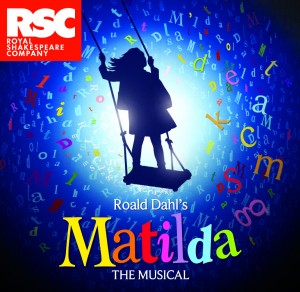
Dahl’s stories often have a dark edge to them, and an understanding that his young readers shouldn’t always need to be protected from the world’s nastiness. Matilda has some darkness at its core – Charlie’s family love him very much, Matilda’s despise her. In its way, it’s a story about child abuse. And the musical doesn’t shy away from this, her parents, while comic, are horrid. And poor Matilda really does feel this sense of not fitting, of not being loved, quite acutely.
Matilda has some good messages for girls then about standing up for yourself, as she sings: “Just because you find that life’s not fair it / Doesn’t mean that you just have to grin and bear it / If you always take it on the chin and wear it / Nothing will change.” Parents will also approve of its messages towards the joys and values of reading.
But there are also some poignant messages for the grownups too, in remembering to look at the world with a child’s gaze. ‘When I grow up’ has the children looking forward to when they will finally be big enough to climb the tallest trees. When did you stop climbing trees?
Minchin’s lyrics music is oh so clever, managing his usual wit (cake eating Bruce’s stomach is equated with the Tardis), social commentary (parents all thinking their child is exceptional) with these carefully done tug-at-the-heart moments. At times Minchin seems to be channelling Sondheim, or a Gilbert & Sullivan patter, but Minchin achieves a clear and cohesive musical voice of his own (unlike erratic Charlie), well attuned to the skills of the talented kids, who have to pull off most of the songs.
Mrs Trunchball, played by a man ala a wicked Pantomime is attractively repulsive. Trunchball swings a kid around in the air by her pigtails, throws her towards the roof of the balcony. Her body suddenly drops from the roof towards the aisle RIGHT NEXT TO ME. The other kids “catch” her, and she stands up, unharmed, RIGHT NEXT TO ME. Wow!
Matilda makes for a wonderful heroine. She has edges, isn’t perfect, and she is hurting. Her telekinesis powers are not pushed like the movie, but arrive at the perfect time. Matilda and the children ensemble are the stars, with fab comic turns from the adult character actors.
Charlie could learn a lot from miss Matilda. As she sings: But nobody else it gonna put it right for me! / Nobody but me is going to change my story! / Sometimes you have to be a little bit naught. She’s the active hero, Charlie the passive. This was a lesson the Factory workers failed to heed, perhaps sticking too faithful to the source. Change your story.As Matilda recognised, a good novel does not necessarily make for good theatre. You have to find the story essence, and then redevelop it for the medium, which is what Matilda the Musical does so well. Let’s hope it comes to our part of the world soon.
Revivals
I caught two major revivals in my time: A Chorus Line, the first here since its 1976 West End debut, and Sondheim’s Merrily We Roll Along (1981, Broadway). A Chorus Line has always been considered a classic, representing a turning point in Musical Theatre History when the “spectacle” was stripped away. Merrily we Roll Along was critically panned when it premiered, and played for only 16 performances on Broadway, but it has since grown in stature.
A Chorus Line has a bare stage and little trickery. Lights, choreography and character are the star. In a town which is still dominated by stars, this show is the anti-star vehicle. We get to know, and feel for, all of the normally faceless characters who are trying out for a show’s chorus. There’s a lot left unresolved at the end of the show too, lots of questions about what happened to them. The montage Hello Twelve, Hello Thirteen, Hello Love just keeps going and going, mixing the singing and choreography with monologue.
Merrily we Roll Along, like Pinter’s Betrayal, has a narrative gimmick of being told in reserve, beginning at the end and working backwards. While this show flopped, the revival (in a smaller theatre, with a largely fixed, few frills set) allows us to appreciate its genius. The theme is the death of the dream by a 1000 cuts. So we begin at the end with defeat, and it tracks back to show us what went wrong for its three main characters and former friends. The gimmick achieves it meaning by taking us finally to the start, where the characters dream idealistically under the stars, ready to take on the world. This is devastating. And far more than it ever could be if told linearly. As we move further away from our inciting sparks of youth, this can be affecting. Sondheim’s orchestration is complex and rich, with brass often used as counterpoint. Excellent character work also drives it forward (or rather, backwards). Both were outstanding, spectacle-free Musical experiences.
Old and New Favourites
I also got to revisit some old musical favourites, and a few more recent ones too.
When will Phantom of the Opera close? What about Les Miserables? These shows, older than me, keep bringing them night in after night, after 28 years in the case of Les Mis on the West End. Surprisingly, they don’t feel tired yet, renewed each time a new cast gets to take on the iconic roles.
This Phantom was the third country I had seen the show in, and the 6th time live (by some measures, still a relative Phantom lightweight!). This time I really loved hearing all the instrumentation, and noted the decorative statues bordering the proscenium – demons ripping into naked damsels, clutching at their breasts. Appropriate.
This Phantom himself was perhaps a little too shouty, but oddly had great vocal control in the songs, and pushed his physicality, like an animal rolling around the ground. I’m nurturing a theory that good Phantom’s need very strong Raouls to put up a good case for Christine, and we had one here. Meg and Christine were beauties.
It’s reassuring to note that though this is one of the longest running musicals in the world, the magic of live theatre means things still to go wrong! A cover for the opening auction scene got stuck on the side as it was meant to be lifted. It took the stage-hands until the end of the Hannibal scene, with some vigorous tugging, to finally remove it.
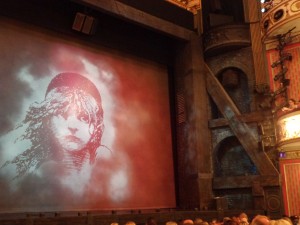
It was great to see Les Mis onstage again (I experienced it professionally as a child watching Rob Guest, as I originally did Phantom actually – thanks Mum and Dad, I owe you), and I was especially renewed with the magic and power that only the live stage can provide. This is Musical Theatre, and this is why I love it.
This time I really appreciated the staging: we are actually mostly in darkness till Paris, the revolve and choreography of the actors doing the work. The barricade set-piece is certainly a wow moment, but otherwise this story is told without too much trickery. The actors and vocals were sublime – Val Jean, Javert, Fantine, Eponine, Marius too. There’s still a lot of life left in old convict.
I also revisited Rock of Ages (frivolous pleasure, and far better than the film), Wicked (in prep for its Auckland leg), and Billy Elliott (originally seen in Oz). If you haven’t seen Elliott, I reckon its one of the great modern musicals. Adapted for the stage with the film’s director and writer, with Elton John on music, it makes for a great package: tense social background of Thatcher’s England and mining strikes to ground it, a father recognising the talent of his son, the power of individuality and dreams. There are many great scenes: the ballet girls, the police, the strikers and Billy all moving the story forward and dancing together (what a juxtaposition!) in Solidarity Forever, Billy’s angry dance, a duet between current and future Billy, Billy’s Electricity (where he tries to explain the feeling he gets when he dances), and an all-tutu wearing finale.
Then there’s current favourite Book of Mormon, which opened in the West End early this year after conquering Broadway. I wrote when I saw it in New York: “I can’t say enough how shockingly good The Book of Mormon was. It’s filthy, offensive, sacrilegious, but in the best spirit of the old-fashioned good time musicals.”
I love how Mormon subverts not only the social and religious, but the musical theatre form itself. It lays bare the tropes. There’s a Wicked moment, a Sound of Music moment, a Lion King moment. In a traditional Musical Elder Price’s Mormon anthem I Believe would have converted the evil Warlord. Such as this Musical’s humour, instead he gets the book of Mormon shoved up the proverbial.
How could the Broadway Musical, and now the West End Musical, recover from this skewering? Like its social-religious targets, it’s done in the spirit of celebration, not mean-spiritedness. This must be part of its triumph. And what else? Story above all else. And a religious one at that.
Africa however is still a subject of some unease. There are still maggots in his scrotum. The problems that the Musical sends-up have not gone away.
The Answer
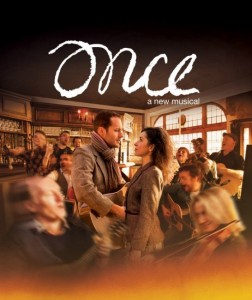
Still, how do you top Mormon? Maybe you can’t. So the answer, it seems, is to go the other direction. What one the Best Musical Tony award after Mormon? That’s would be Once, based on the film (its song Falling Slowly won an Oscar), which opened on this West End this year.
The actors are also the musicans, and are onstage the entire time (there’s some great choreography involving them and their instruments). The set is a pub, and the audience are invited onto the stage preshow to order at the bar, and the cast play Irish music around them. It’s a wonderful exchange. As the audience take their seats, they keep playing. Then one of the musicians asks the guy if he has a song. He plays. House and stage lights very slowly dim, easing us into the transition. The girl asks ihim if that is his song. And we are away.
It’s a show that breaths, unafraid of small and simple: one of the best was just the girl at the piano. It’s a story of mutual love, where obstacles get in the way of those who “should” be together. About how people meet, and can make an indelible mark on another’s life. It’s a beautiful masterpiece, pure, emphasising story (again) and musicality.There was something really pure and soulful about it all. A special London moment.
Maybe we could turn Viva Forever into a laidback, acoustic Spice Girls musical set at a pub? Now that would be a fascinating musical.
PART TWO: The Play‘s the thing. How good are those Shakespeare’s really? And I continue to stalk Daniel Radcliffe in theatre productions around the world.



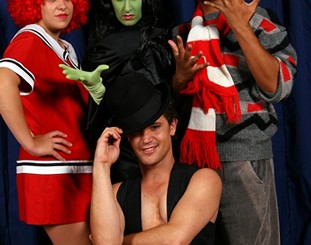
Leave a Reply